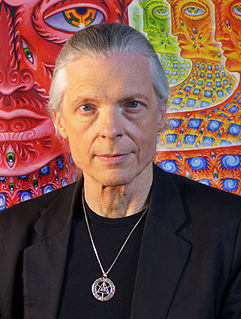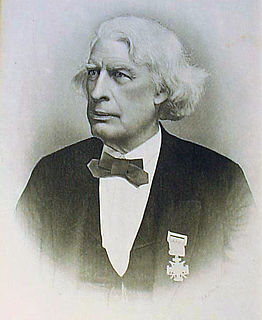A Quote by John Stuart Mill
The principle itself of dogmatic religion, dogmatic morality, dogmatic philosophy, is what requires to be rooted out; not any particular manifestation of that principle. The very corner-stone of an education intended to form great minds, must be the recognition of the principle, that the object is to call forth the greatest possible quantity of intellectual power, and to inspire the intensest love of truth.
Related Quotes
Death makes me realize how deeply I have internalized the agnosticism I preach in all my books. I consider dogmatic belief and dogmatic denial very childish forms of conceit in a world of infinitely whirling complexity. None of us can see enough from one corner of space-time to know "all" about the rest of space-time.
The Cabal is of two kinds, theoretical and practical, with the practical Cabala, which is engaged in the construction of talismans and amulets, we have nothing to do. The theoretical is divided into the lineal and dogmatic. The dogmatic is nothing more than the summary of the metaphysical doctrine taught by the Cabalist doctors. It is, in other words, the system of the Jewish philosophy.
In every man and in every animal, however weak or wicked, great or small, resides the same omnipresent, omniscient soul. The difference is not in the soul, but in the manifestation. Between me and the smallest animal, the difference is only in manifestation, but as a principle he is the same as I am, he is my brother, he has the same soul as I have. This is the greatest principle that India has preached.
It is never to be expected in a revolution that every man is to change his opinion at the same moment. There never yet was any truth or any principle so irresistibly obvious that all men believed it at once. Time and reason must cooperate with each other to the final establishment of any principle; and therefore those who may happen to be first convinced have not a right to persecute others, on whom conviction operates more slowly. The moral principle of revolutions is to instruct, not to destroy.
The one great principle of the English law is, to make business for itself. There is no other principle distinctly, certainly, and consistently maintained through all its narrow turnings. Viewed by this light it becomes a coherent scheme, and not the monstrous maze the laity are apt to think it. Let them but once clearly perceive that its grand principle is to make business for itself at their expense, and surely they will cease to grumble.
Those wretches tainted with the error of Indifferentism and Modernism hold that dogmatic truth is not absolute, but relative: that is, that it must adapt itself to the varying necessities of the times and the varying dispositions of souls, since it is not contained in an unchangeable revelation, but is, by its very nature, meant to accommodate itself to the life of man.







































